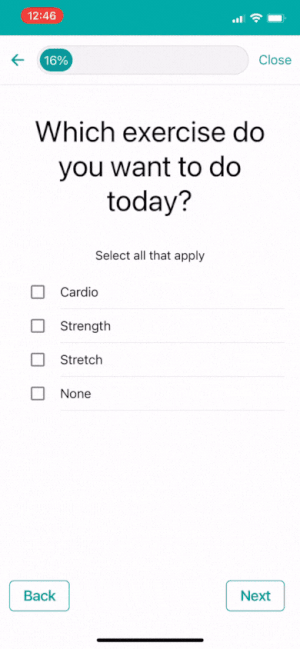 Another call to customer service comes in. “Please,” the patient begs, “Please help me get into the app. I haven’t seen Timmy in 3 days!” She goes on to explain how she doesn’t want to let him down, and we get it. Timmy is her virtual pet turtle who thrives when she sticks to her health program, but withers when she falters. And she’s not alone in her attachment to her turtle. We hear from patient after patient how they are sure to take their medication or do their physical therapy exercises — all just to keep their turtle happy. And research from behavioral science shows that, perhaps surprisingly, people often treat virtual pets like real pets — forming emotional connections with them and working hard to keep them well.*
Another call to customer service comes in. “Please,” the patient begs, “Please help me get into the app. I haven’t seen Timmy in 3 days!” She goes on to explain how she doesn’t want to let him down, and we get it. Timmy is her virtual pet turtle who thrives when she sticks to her health program, but withers when she falters. And she’s not alone in her attachment to her turtle. We hear from patient after patient how they are sure to take their medication or do their physical therapy exercises — all just to keep their turtle happy. And research from behavioral science shows that, perhaps surprisingly, people often treat virtual pets like real pets — forming emotional connections with them and working hard to keep them well.*
Naming the turtle is just the first step. While this particular patient named her turtle Timmy, there are thousands of other patients using Pattern Health programs with turtles named Donatello, Virgil, and even Dog. These patients gave their virtual turtle a name, and in doing so, instantly became more attached to it than if the pet came with a name out of the box. This small act of customization hinges on what behavioral scientists call the endowment effect, where people tend to value things more when they feel a sense of ownership. And this effect holds even when people have only owned something for a few minutes!
Once patients have named their virtual pet, they deepen their bond by interacting with it daily, seeing their turtle celebrate each task that they complete in their health program. The small joy that patients get from the pet’s celebration serves as instant gratification, an immediate reward for engaging in the small steps that accumulate to long-term outcomes.
It is tempting to think that the long-term reward of better health is motivating enough in itself, but people can often be more motivated by smaller, sooner rewards than much larger rewards that are far off in the future.
And research shows that something as seemingly insignificant as a virtual pet can have an important impact on behavior change. In one study, people were more likely to stick to pro-environmental commitments if they cared for a virtual polar bear that was standing on ever-melting ice caps.** Amazingly, people can be motivated to act by something as small as a virtual pet.
Patients using the Pattern Health platform have long had the option to care for a virtual turtle (or a meter that simply tracks their daily progress), but we have exciting news: They can now choose from one of four virtual pets! In addition to the shy turtle, they can now choose a friendly dog, supportive dolphin, or even a snarky cat.
These pets are loaded with personality, but not just any arbitrary set of traits. Their personas are based on emerging clusters from the Big 5 model of personality, the most reliable and commonly used framework in personality science. Scientists have long believed that people can’t be grouped into such a small number of personality “types” but these four clusters come remarkably close, and researchers have found that almost half of all people can be categorized into one of these four personas.*** Patients might find themselves relating to the new pets more than they expect. And with these new pets, we look forward to seeing what patients choose as their names. Perhaps someone will even name their dog “Turtle.”

Enable Virtual Pets for Your Digital Health Program
Virtual pets are easy to activate as a part of your digital health program, whether you are an existing customer or just starting to build your program on our platform.
Contact us to learn more or to request virtual pets for your program.
Further Reading
*Tsai, Y. F. L., & Kaufman, D. M. (2009). The socioemotional effects of a computer-simulated animal on children’s empathy and humane attitudes. Journal of Educational Computing Research, 41(1), 103-122.
**Dillahunt, T., Becker, G., Mankoff, J., & Kraut, R. (2008). Motivating environmentally sustainable behavior changes with a virtual polar bear. Pervasive 2008 Workshop Proceedings, Vol. 8, pp. 58-62.
***Gerlach, M., Farb, B., Revelle, W. et al. A robust data-driven approach identifies four personality types across four large data sets. Nat Hum Behav 2, 735–742 (2018).